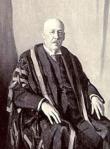Opthalmologist, physiologist and university lecturer, James W. Barrett was educated at Melbourne Church of England Grammar School and Carlton College. In 1876 he entered the University of Melbourne (M.B., 1881; Ch.B., 1882) and was the first secretary of the Medical Students' Society in 1880.
He was a competent pianist and helped to form the University Conservatorium Symphony Orchestra.
He was honorary secretary of the Australian Red Cross and in October 1914 he joined the Australian Imperial Force with the rank of major. He arrived in Heliopolis in January 1915 and served in the 1st Australian General Hospital at Heliopolis as registrar, oculist and consultant to the British forces in Egypt.
In 1919 Barrett returned to Australia and organized a branch of the National Party in Toorak, with himself as chairman and his daughter as secretary, and won pre-selection for the 1920 Legislative Assembly election, but was not elected to parliament.
He became vice-chancellor of the University of Melbourne in 1931, deputy chancellor in 1934 and chancellor in 1935-39. He retired from teaching in 1937, having contributed significantly to the development of the university, its faculty structure and medical curriculum.
From the 1890s Barrett contributed considerably to The Argus and his list of public and charitable commitments was formidable. Even at 75, he was active on twenty-eight committees, being president of twelve, vice-president of two, chairman of seven and honorary secretary of three. He promoted the Worker's Educational Association, was chairman of the National Parks Committee, and president of the Town Planning and Playgrounds associations and the Japan Society.
He was a vocal supporter of decimalization, proportional representation, Empire affairs, venereal disease, neglected children, technical education, immigration, the League of Nations, preventive medicine, pure milk, baby clinics and a world calendar. In 1910 he founded the Bush Nursing Association movement.
 3892306479407496831.jpg
3892306479407496831.jpg
